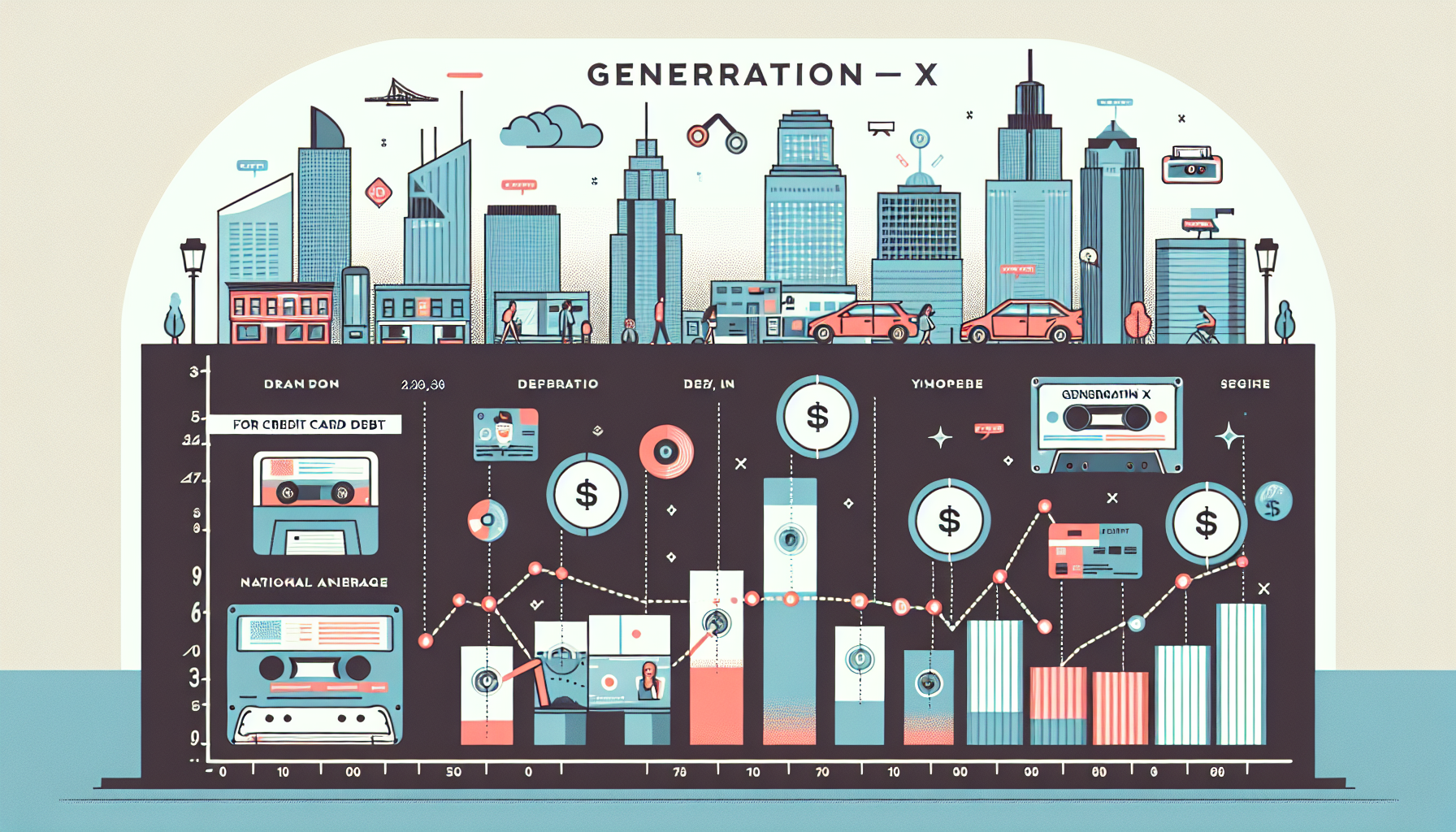Generation X, those born between 1965 and 1980, are often referred to as the “middle child” generation, sandwiched between Baby Boomers and Millennials. This generation has experienced significant economic changes, from the tech boom to the housing crisis, affecting their financial stability. In recent years, Gen Xers have faced increasing credit card debt, exacerbating their financial pressures. This article explores the top five cities where Gen Xers are grappling with the highest credit card debt and delves into the financial struggles that accompany this burden.
Top 5 Cities Where Gen Xers Face High Credit Card Debt
1. New York, NY
New York City, known for its high cost of living, tops the list of cities where Gen Xers are struggling with substantial credit card debt. The city’s real estate market, characterized by skyrocketing rent and housing prices, pushes many residents to rely on credit cards to afford everyday expenses. The bustling lifestyle and the constant influx of new opportunities can often lead to overextension of personal finances. Gen Xers in New York are finding it challenging to balance their income with the city’s high demands, leading to significant credit card debt.
2. Los Angeles, CA
Los Angeles, with its glamorous allure and sprawling suburbs, is another hotspot for Gen Xers facing high credit card debt. The entertainment hub’s cost of living, paired with the pressure to maintain a certain lifestyle, drives many to accumulate credit card debt. Housing costs in Los Angeles are notoriously high, and commuting expenses further strain budgets. Gen Xers, who often have families and responsibilities, find themselves dependent on credit cards to bridge the gap between their earnings and the cost of living, resulting in mounting debt.
3. Miami, FL
Miami’s vibrant culture and growing economy attract a diverse population, including many Gen Xers. However, the city’s cost of living, combined with a sometimes unstable job market, contributes to high levels of credit card debt among this demographic. The allure of Miami’s nightlife and luxury living can tempt residents to overspend, leading to financial strain. Additionally, the frequent occurrence of natural disasters, such as hurricanes, often results in unexpected expenses, pushing many Gen Xers to rely heavily on credit to manage these situations.
4. Chicago, IL
Chicago, with its rich history and economic diversity, also sees a significant number of Gen Xers struggling with credit card debt. The city’s higher-than-average cost of housing and utilities, coupled with the need for reliable transportation, places a heavy financial burden on residents. Job market fluctuations in key sectors such as manufacturing and finance can lead to periods of instability, forcing many Gen Xers to turn to credit cards to maintain their standard of living. The economic pressures in Chicago make it difficult for this generation to manage and pay off their credit card debt.
5. Houston, TX
Houston, known for its booming energy sector, has become a city where many Gen Xers face high credit card debt despite the relatively lower cost of living compared to other major cities. The city’s economic dependence on the oil and gas industry means job security can be volatile, leading to periods of financial instability for residents. Medical expenses, often uninsured or underinsured, also contribute significantly to credit card debt among Houstonians. For Gen Xers, balancing family expenses, healthcare costs, and occasional layoffs creates a financial environment ripe for credit card dependence.
Financial Struggles: Gen Xers Burdened by High Debt
The Impact of Housing and Living Costs
Across these top five cities, one common thread exacerbating credit card debt for Gen Xers is the high cost of housing and living expenses. Whether it’s New York’s astronomical rent prices or Los Angeles’s costly lifestyle, Gen Xers often find themselves spending more than they earn. This deficit frequently leads to reliance on credit cards to cover basic needs, resulting in accumulating debt that becomes difficult to manage. Housing costs, a significant part of monthly expenses, leave little room for savings or debt repayment, pushing Gen Xers into a cycle of financial distress.
Employment Instability and Healthcare Expenses
Another contributing factor to the financial struggles of Gen Xers is employment instability and rising healthcare costs. Cities like Houston and Chicago, with economies sensitive to market fluctuations, leave many Gen Xers vulnerable to job loss or reduced income. Additionally, unexpected medical expenses, which are not always fully covered by insurance, compel many to use credit cards as a financial safety net. These unforeseen costs add to existing debt, making it harder for Gen Xers to regain financial stability and pay off their credit cards.
Societal Pressures and Lifestyle Choices
Societal pressures and lifestyle choices also play a significant role in the accumulation of credit card debt among Gen Xers. The desire to keep up with peer standards, maintain a certain quality of life, or provide for their families often leads to spending beyond their means. In cities like Miami and Los Angeles, the cultural pressure to live a glamorous, high-end lifestyle can be particularly intense. This urge to fit in or stand out contributes to credit card usage, pushing many Gen Xers deeper into debt as they strive to balance societal expectations with their financial reality.
The financial struggles faced by Gen Xers in cities like New York, Los Angeles, Miami, Chicago, and Houston highlight the broader economic challenges impacting this generation. High housing costs, employment instability, and societal pressures combine to create a precarious financial situation for many. Addressing these issues requires a multifaceted approach, including better financial education, more affordable housing options, and greater job security. By understanding the unique challenges faced by Gen Xers, policymakers and financial institutions can work together to provide the support needed to help this generation achieve financial stability and reduce their reliance on credit card debt.
